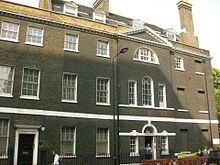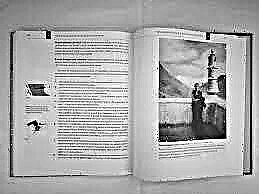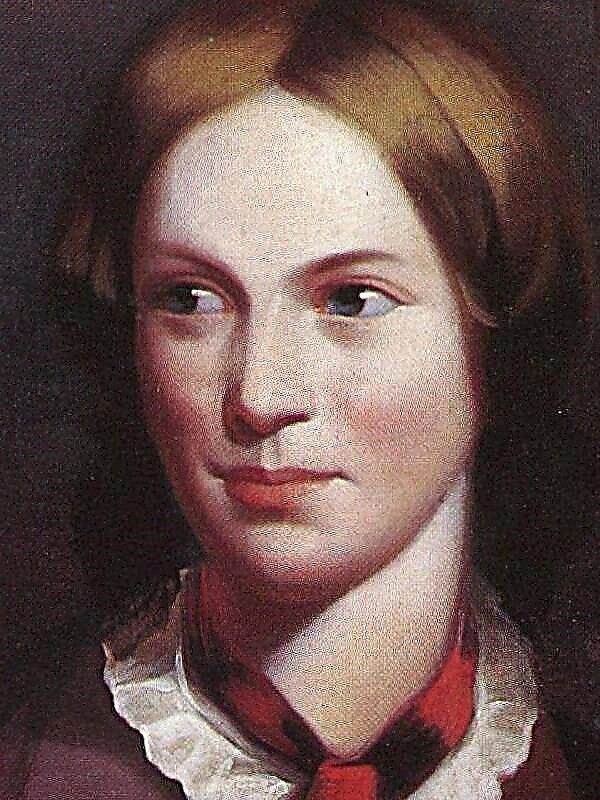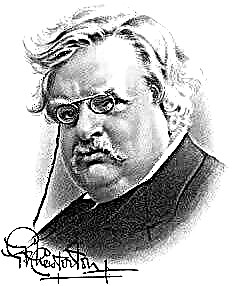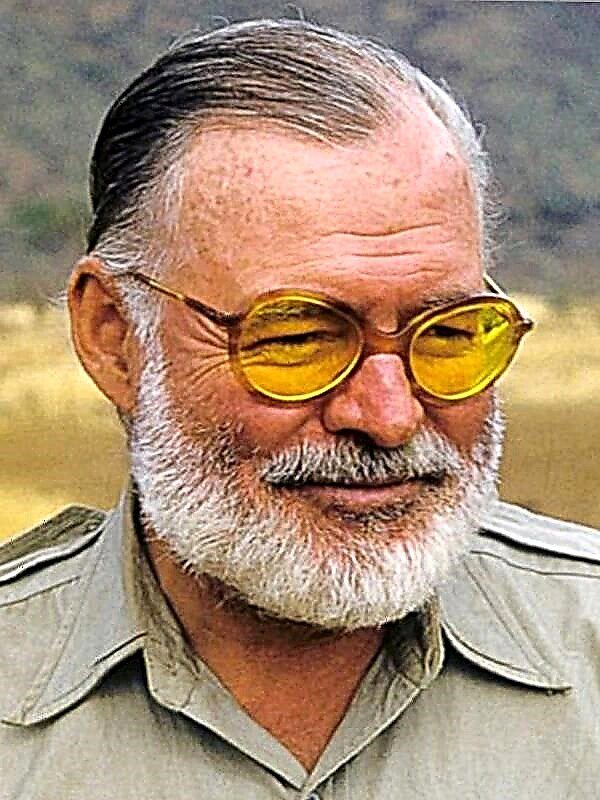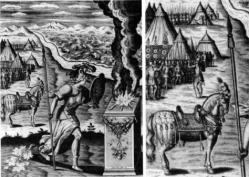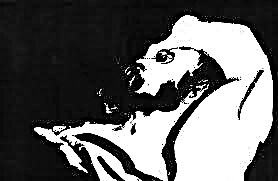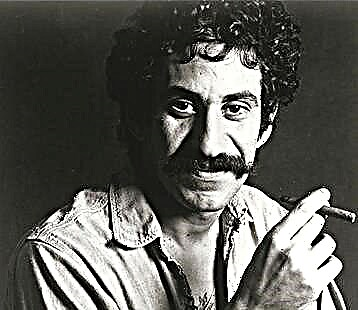During the Crusades at the end of the XII century. the crusaders are defeated in their third campaign and are forced to conclude a truce with the Arab sultan Saladin, who rules Jerusalem. Twenty captive knights were brought into the city, and all, with the exception of one, were executed by order of Saladin. The surviving young knight-templar freely walks around the city in a white cloak. During the fire that occurred in the house of the wealthy Jew Nathan, a young man rescues his daughter Rehu at the risk of his own life.
Nathan returns from a business trip and brings a wealth of cargo from Babylon on twenty camels. People of the same faith honor him “like a prince,” and they nicknamed him “Nathan the Sage,” not “Nathan the Rich Man,” as many note. Nathan is met by his daughter's girlfriend, Christian Daya, who has long lived in the house. She tells the owner about what happened, and he immediately wants to see the noble youth-savior, to generously reward him. Daya explains that the templar does not want to communicate with him and answers her invitation to visit their house with bitter ridicule.
The modest Reha believes that God “performed a miracle” and sent her a “real angel” with white wings to save her. Nathan instructs his daughter that it is much easier to dream devoutly than to act according to conscience and duty, devotion to God should be expressed by deeds. Their common task is to find a templar and help a Christian, alone, without friends and money in a strange city. Nathan considers it a miracle that her daughter remained alive thanks to a man who himself was saved by "a considerable miracle." Saladin had never shown mercy to captive knights. Rumor has it that in this temple, the Sultan finds a great resemblance to his beloved brother, who died twenty years ago. During the absence of Nathan, his friend and chess partner, dervish Al-Ghafi, becomes the treasurer of the Sultan. This is very surprising for Nathan, who knows his friend as a "dervish in his heart." Al-Ghafi informs Nathan that Saladin’s treasury is impoverished, the armistice due to the crusaders is drawing to a close, and the Sultan needs a lot of money for the war. If Nathan "opens his chest" for Saladin, then he will help to fulfill Al-Ghafi's official duty. Nathan is ready to give money to Al-Ghafi as his friend, but not at all as the treasurer of the Sultan. Al-Ghafi admits that Nathan is as good as smart, he wants to cede to Nathan his treasurer position in order to become a free dervish again.
A novice from the monastery, sent by the patriarch who wants to find out the reason for the mercy of Saladin, is approaching the templar walking near the sultan's palace. The templar knows nothing but rumors, and the novice gives him the opinion of the patriarch: the Most High must have kept the templar for "great things." The templar notes with irony that salvation from the fire of a Jewess is certainly one of such cases. However, the patriarch has an important assignment for him - to transfer Saladin’s military calculations to the crusaders in the camp of the enemy of the Sultan. The young man refuses, because he owes his life to Saladin, and his duty as a templar of the order is to fight, and not to serve "in scouts." The novice approves the templar’s decision not to become an “ungrateful villain.”
Saladin plays chess with his sister Zitta. Both understand that a war that they do not want is inevitable. Zitta is outraged by Christians who extol their Christian pride instead of worshiping and following common human virtues. Saladin defends Christians, he believes that all evil is in the order of the templars, that is, in organization, and not in faith. In the interests of chivalry, they turned themselves into "stupid monks" and, blindly counting on luck, they break the truce.
Al-Ghafi arrives, and Saladin reminds him of money. He offers the treasurer to turn to a friend of Nathan, about whom he heard that he is wise and rich. But Al-Ghafi is cunning and assures that Nathan never loaned money to anyone, but, like Saladin himself, only serves the poor, be it a Jew, a Christian or a Muslim. In money matters, Nathan acts like an “ordinary Jew." Al-Ghafi later explains to Nathan his lie with sympathy for a friend, his reluctance to see him as treasurer at the Sultan, who "will take off his last shirt."
Daia persuades Nathan to turn to the Templar himself, who will be the first to “not go to the Jew.” Nathan does this and comes across a contemptuous reluctance to speak "with the Jew," even with the rich. But Nathan’s persistence and sincere desire to express gratitude for his daughter act on the templar, and he enters into conversation. Nathan’s words that a Jew and a Christian should first of all express themselves as people and only then, as representatives of their faith, find a response in his heart. The templar wants to become Nathan's friend and get to know Reha. Nathan invites him to his house and learns the name of the young man - it is of German origin. Nathan recalls that many representatives of this genus visited this region and the bones of many of them rot here in the earth. The templar confirms this, and they part. Nathan thinks of the unusual similarity of the young man with his long-dead friend, which leads him to some suspicions.
Nathan is summoned to Saladin, and the templar, not knowing about it, comes to his house. Reha wants to rush at the feet of her savior, but the templar holds her and admires the beautiful girl. Almost immediately, he embarrassedly runs after Nathan. Reha admits to Daya that, for an unknown reason, she “finds her peace” in the “concern” of the knight that struck her in the eye. The girl’s heart "began to beat evenly."
To the surprise of Nathan, who was expecting a question about money from the Sultan, he impatiently demands a wise Jew a direct and frank answer to a completely different question - which faith is better. One of them is a Jew, the other is a Muslim, the templar is a Christian. Saladin claims that only one faith can be true. In response, Nathan tells a tale of three rings. One father, who by inheritance had a ring, possessing wonderful power, had three sons, whom he equally loved. He ordered two more rings, completely similar to the first, and before his death he gave each son a ring. Then none of them could prove that it was his ring that was miraculous and made the owner of it the head of the clan. Just as it was impossible to find out who has a real ring, one cannot give preference to one faith over another.
Saladin acknowledges the truth of Nathan, admires his wisdom and asks to become a friend. He does not talk about his financial difficulties. Nathan himself offers him his help.
The templar lies in wait for Nathan, returning from Saladin in a good mood, and asks for his hand Rehi. During the fire, he did not see the girl, and now fell in love at first sight. The young man does not doubt the consent of Reha's father. But Nathan needs to understand the templar’s genealogy, he does not give him an answer, which, without wanting it, offends the young man. From Daya, the templar learns that Reha is Nathan's adopted daughter, she is a Christian. The templar searches for the patriarch and, without naming names, asks if the Jew has the right to raise a Christian in the Jewish faith. The patriarch severely condemns the "Jew" - he must be burned. The patriarch does not believe that the question of the templar is abstract in nature, and tells the novice to find a real "criminal".
The templar trustingly comes to Saladin and talks about everything. He already regrets his action and is afraid for Nathan. Saladin reassures the young man with a hot character and invites him to live in his palace - as a Christian or as a Muslim, anyway. The templar gladly accepts the invitation.
Nathan learns from a novice that it was he who, eighteen years ago, handed him a baby girl who was left without parents. Her father was a friend of Nathan, more than once saved him from the sword. Shortly before that, in the places where Nathan lived, Christians killed all Jews, while Nathan lost his wife and sons. The novice gives Nathan a prayer book in which the pedigree of the child and all relatives is recorded by the hand of the owner - father of the girl.
Now Nathan also knows the origin of the templar, who repents before him of his involuntary denunciation to the patriarch. Nathan, under the auspices of Saladin, is not afraid of the patriarch. The templar again asks Nathan for Reha’s hand, but cannot get an answer.
In the palace of the Sultan of Reh, upon learning that she is Nathan's adopted daughter, on her knees begs Saladin not to separate her from her father. Saladin does not have this in his thoughts, he jokingly offers her himself as a "third father." At this time, Nathan and the Templar come.
Nathan announces that the Templar is Rehi's brother; their father, a friend of Nathan, was not German, but was married to a German and lived in Germany for some time. The father of Rehi and the templar was not European and preferred Persian to all languages. Then Saladin realizes that we are talking about his beloved brother. This confirms the entry in the prayer book made by his hand. Saladin and Zitta enthusiastically embrace their nephews, and moved Nathan hopes that the templar, like the brother of his adopted daughter, will not. refuses to become his son.

